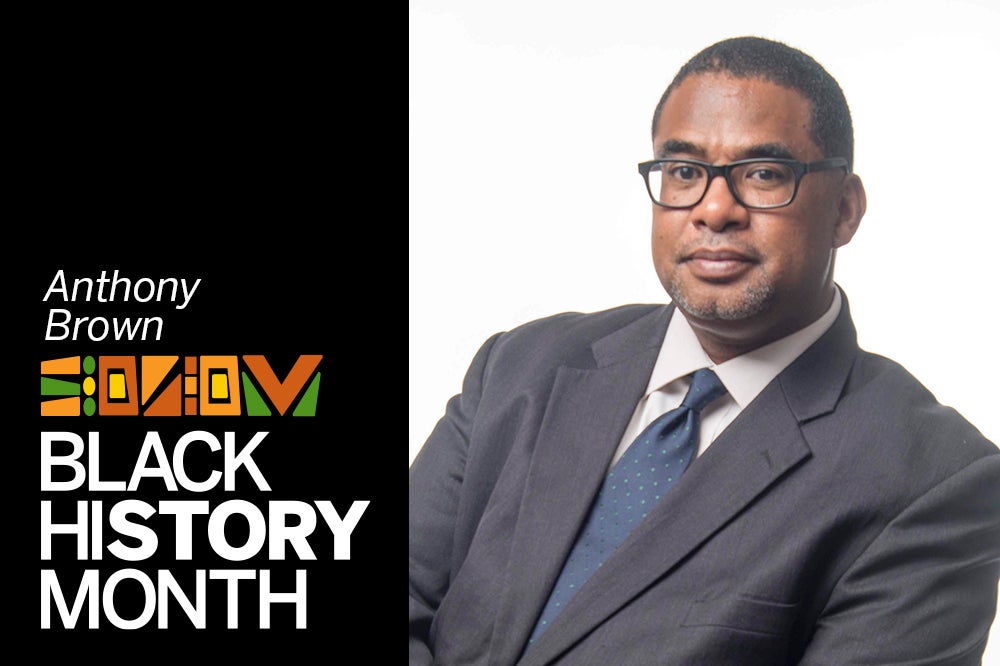
As part of a storytelling series celebrating Black History Month, we welcomed our community members to share their stories to inspire others and encourage open, thought-provoking dialogue. We sat down with Dr. Anthony Brown, professor in the Department of Curriculum and Instruction, to tell us more about his academic journey, the people who helped him along the way and what Black History Month means to him.
In addition to being a faculty member in the College of Education, Dr. Brown is also an affiliated faculty member in the areas of cultural studies in education, the John Warfield Center of African and African American Studies and the Department of African and African Diaspora Studies. From 2021-22, Dr. Brown served as the chair of the UT Austin Faculty Council and is currently the graduate advisor of record in the Department of Curriculum and Instruction. His research broadly examines the representation of African Americans within the school curriculum, social science thought and popular culture.
What does Black History Month mean to you?
Black history symbolizes the long civil rights movement poised at acknowledging the beauty and genius of the African Diaspora. Black History Month, in some sense, is a celebration and moment to reflect on the experience of African Americans by meditating on our past, present and future lives in the U.S.
Do you feel your interest area has been shaped, changed or influenced by current events, now or when you were younger?
It is without question that my upbringing had a direct impact on my research. I grew up in a home filled with Black-themed art, books and cultural artifacts. In this context, people from the African Diaspora were beautiful, brilliant and resilient. However, I soon realized that outside of my home and specifically in academic spaces, Black people were absent from the histories and cultures that deserved acknowledgment. Therefore, my research trajectory has taken a deep theoretical and empirical approach to redress this invisibility.
What do you feel are some of the biggest challenges you’ve faced in your academic or professional career, and what are some of your greatest accomplishments to date?
My long journey to academia and the residual from these experiences have been the most significant challenge I have faced as an academic. I was not by any measure a gifted or high-performing student. I was intelligent and able to think deeply about different aspects of the human condition but had not figured out how to successfully navigate U.S. schools. This kind of doubt would carry into graduate school. While working on my Ph.D., I initially had concerns about my ability to complete the Ph.D. and land a tenure-track position. I soon realized I could only overcome such doubt by being precise and meticulous with my studies. I thus threw myself into the ideas, histories and methods germane to my line of scholarship. This mindset of being diligent and rigorous has had the most significant impact on my journey, and 17 years later, I have had a pretty accomplished journey as a professor.
Was there anyone or any program that helped give you confidence or mentorship along the way? If so, tell us a little bit about that experience and what it meant to you.
The first would have to be Dr. Keffrelyn Brown, my wife, co-author and faculty member here at UT Austin. Whenever I had doubts or questions about my ability to meet specific research or writing goals, she always reminded me that I have all I need to achieve whatever I wish to accomplish in life and academia. The other person must be Dr. Carl A. Grant, professor of Curriculum and Instruction at the University of Wisconsin-Madison. There is a long story about how he was responsible for getting me to UW-Madison. Still, for more than 20 years, he has been profoundly supportive and engaging with my work and journey as a scholar of curriculum and instruction.
In the past few years there have been many movements for change and changes made in the story of Black history. Are there any notable recent changes that you have noticed or really appreciated?
The Black Lives Matter (BLM) movement made a profound pronouncement to the world that Black life matters. It was sad that in the 21st century, it had to be stated in the most overt terms that a racial group’s life mattered. Mattering, of course, was not the only purpose of the BLM. Still, in the context of schools and higher education, it helped to catalyze a widespread concern about the histories and cultures of African Americans in an unprecedented fashion.

